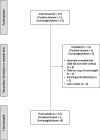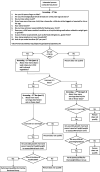A positive deviance-based qualitative study of stress, coping, and feeding practices among low-income, Hispanic mothers whose children do versus do not meet guidelines for fruit and vegetable intake
- PMID: 33367771
- PMCID: PMC8463094
- DOI: 10.1093/her/cyaa037
A positive deviance-based qualitative study of stress, coping, and feeding practices among low-income, Hispanic mothers whose children do versus do not meet guidelines for fruit and vegetable intake
Abstract
Less than 1% of children in the United States concurrently meet guidelines for fruit/vegetable intake, physical activity, screen time, and sugar-sweetened beverages. Prior evidence suggests that parents of this 1% potentially cope with stress differently. This qualitative study used a positive deviance-based approach to locate mothers whose children avoided negative feeding outcomes despite being 'high-risk' for obesity. Semi-structured interviews were conducted in Spanish for two groups: low-income, Hispanic mothers whose children were normal weight and met recommendations for fruits/vegetables and physical activity (n = 5); and a comparison group whose children had obesity and did not meet guidelines (n = 8). Topics included weight-related parenting practices, attitudes toward health, and stress management. Interviews were transcribed, translated, and coded using NVivo for theoretically driven thematic analysis. Results suggested that mothers viewed stress differently. Mothers of healthy weight children believed stress could be prevented, such as by paying children more attention or directing one's attention away from stressors; comparison group mothers tended to report stress about managing their child's eating and about financial worries. Future research is needed to understand the underlying sources of these differences (e.g. personality traits, coping practices) and test whether stress prevention interventions can promote healthy parental feeding practices.
© The Author(s) 2020. Published by Oxford University Press. All rights reserved. For permissions, please email: journals.permissions@oup.com.
Figures
References
-
- Schlechter CR, Rosenkranz RR, Guagliano JM. et al.A systematic review of children’s dietary interventions with parents as change agents: application of the RE-AIM framework. Prev Med 2016; 91: 233–43. - PubMed
-
- Faith MS, Van Horn L, Appel LJ. et al.Evaluating parents and adult caregivers as “agents of change” for treating obese children: evidence for parent behavior change strategies and research gaps: a scientific statement from the American Heart Association. Circulation 2012; 125: 1186–207. - PubMed
Publication types
MeSH terms
Grants and funding
LinkOut - more resources
Full Text Sources
Miscellaneous




